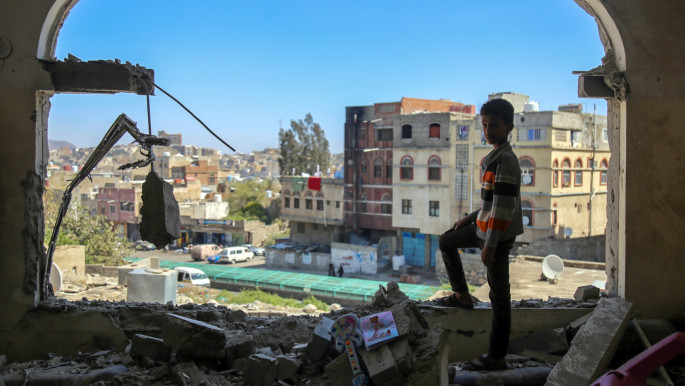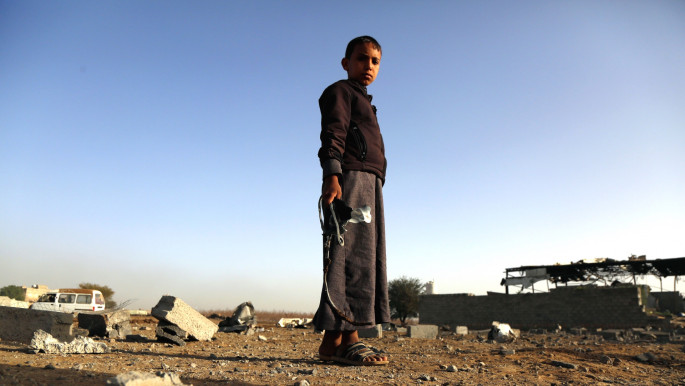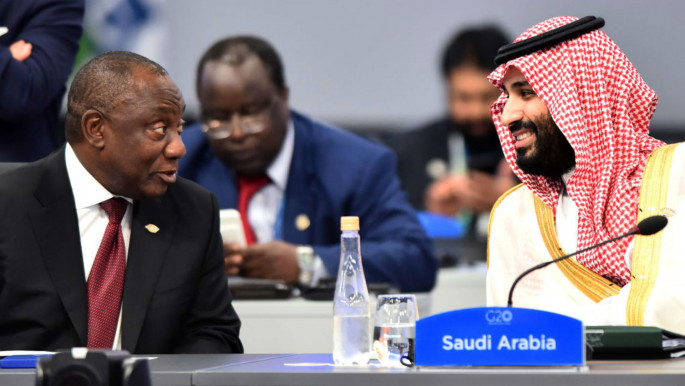How South African weapons are fuelling war crimes in Yemen
However, decades later, South African-made weaponry has been deeply involved in the humanitarian crisis in Yemen.
Reports confirm that the country's arms control body continues to approve weapons exports to Saudi Arabia and the United Arab Emirates (UAE), central protagonists leading a military campaign in Yemen since 2015 that has been characterised by widespread human rights violations and war crimes.
A history of arms sales
In September 1994 - just four months after Mandela's inauguration - the ANC-led government was rocked by media reports that a large consignment of South African weapons had been sold by the government-owned arms company, Armscor, to war-torn Yemen.
As a central pillar of the apartheid regime, Armscor was established to circumvent the UN arms embargo imposed on Pretoria in 1977. Not only did Armscor arm apartheid security forces so they could internally crush resistance to apartheid, but it also supplied weapons to fuel destabilising wars throughout southern Africa in an effort to weaken support for South Africa's liberation movements.
 |
Nelson Mandela proudly promised that in the new South Africa human rights would be the 'light that guides our foreign affairs' |  |
Weapons of South African origin were involved in killing fields across the world, from massacres in the former Yugoslavia to genocide in Rwanda. Armscor's culture of impunity was inconsistent with the principles of a liberated South Africa, leading Mandela's government to swiftly investigate weapons sales.
A new beginning for SA's arms industry
Mandela's investigation transformed South Africa's weapons industry and precipitated the formation of the National Conventional Arms Control Committee (NCACC). The NCACC was comprised of ministers from various government departments, including Defence, Justice, and International Affairs, with a mandate to ensure that South Africa did not become complicit in human rights violations.
 |
|
| Read more: How the odds were stacked against Yemen's Arab Spring revolution |
In 2002, the government passed the National Conventional Arms Control Act, requiring arms companies to apply for export permits. Permits were granted only after the NCACC assessed each application, ensuring that weapons were not being sent to "governments that systematically violate or suppress human rights."
The purchasing country must honour an end-user certificate (EUC) and agree not to transfer munitions to other parties without South Africa's permission. Weapons were not to be sold to governments that violated EUC undertakings.
On paper, South Africa had a rigorous set of laws and institutions to ensure that its post-apartheid weapons industry could free itself from a sordid history of illicit arms trafficking to some of the world's most murderous regimes.
The NCACC and Yemen
However, evidence suggests that 27 years into its democracy, South Africa's arms trade still bears a resemblance to its apartheid-era predecessor.
A new report by South African civil society group, Open Secrets, has exposed what appears to be an indifferent approach on the part of the NCACC to both human rights and regulation, and the lethal consequences of its failure to properly scrutinise weapons exports.
 |
Evidence suggests that 27 years into its democracy, South Africa's arms trade still bears a resemblance to its apartheid-era predecessor |  |
In 2015, more than 42% of South Africa's weapons exports went to Saudi Arabia and the UAE. In 2016, that number climbed to 48.9%. In 2017 and 2018, over a third of all SA weapons exports went to the Emiratis and the Saudis.
Over this same period, there have been scores of publicly documented deadly air strikes by the Saudi and UAE-led coalition on Yemeni homes, schools, hospitals, markets, mosques, weddings, and funerals. In this time the NCACC has continued approving weapons exports to these countries.
Weapons gone astray
In violation of its EUC agreements, Saudi Arabia and the UAE have been diverting South African weapons to militias in Yemen. Since 2015, SA-made weaponry has been documented on all sides of the conflict in Yemen.
Some weapons were produced by South Africa's state-owned manufacturer Denel, a descendent of Armsco; others by German company Hensoldt, which has production facilities in South Africa.
One of the most egregious diversions of South African weapons involves Rheinmetall Denel Munition (RDM), a joint venture between German arms company Rheinmetall Waffe Munition GmbH and South African Denel.
 |
|
| Read more: Can European arms companies be held liable for war crimes in Yemen? |
There is compelling evidence from independent experts and the UN that the mortars used in a 2018 attack on a fish market and hospital in Hodeidah which killed 64 civilians – and which was deemed a war crime – had likely originated from RDM.
The National Conventional Arms Control Act and the UN Arms Trade Treaty require the NCACC to take diversion of weapons into account when considering export applications. However, the NCACC continues to approve arms destined for the Emiratis and the Saudis – serial violators of EUC agreements.
Assessing weapons applications
There is confusion about the information that the NCACC uses to assess weapons applications.
Jackson Mthembu was the chairperson of the NCACC until his death in January 2021. In August 2020, Mthembu told Open Secrets that the NCACC relied on the Department of International Relations and Cooperation (DIRCO), the State Security Agency (SSA) and Defence Intelligence (DI) for information and to flag concerns.
However, three months prior, Defence Committee chairperson Cyril Xaba, told parliament that the NCACC relies almost entirely on the media and public reporting for information.
 |
A new report by South African civil society group, Open Secrets, has exposed what appears to be an indifferent approach to both human rights and regulation, and the lethal consequences of failing to properly scrutinise weapons exports |  |
Public reports from the UN, Yemeni and international NGOs have painstakingly analysed the devastation in Yemen and the role of the Saudi-led coalition, but have been widely ignored by the NCACC.
Mthembu also told Open Secrets that RDM's possible involvement in the Hodeidah attack "is of no concern to the NCACC" because information on the incident had not been directed to South Africa's UN Mission in New York.
Mthembu's response suggests that the legal and institutional frameworks established to ensure that South Africa's weapons trade is not complicit in human rights violations may not be functioning correctly.
 |
|
| Read more: No, 'job losses' isn't justification for continued arms exports to Saudi Arabia |
The role of the Department of International Relations and Co-operation (DIRCO) is acutely aware of the devastation caused by the war in Yemen.
In 2019, Minister Naledi Pandor spoke about Yemen at the UN. In 2020, South Africa's representatives to the UN expressed concern at the human rights situation of Yemeni civilians.
DIRCO has not used its position within the NCACC to discourage the export of weapons to countries involved in the conflict in Yemen.
A missed opportunity
In 2019, the NCACC briefly halted weapons exports to Saudi Arabia and the UAE. Two years earlier, the NCACC had moved a clause requiring on-site inspections to the front page of its end-user agreements. Saudi Arabia, UAE, and several other countries, refused to sign the agreements, alleging that it violated their sovereignty.
A diplomatic spat followed and by the end of 2019 the NCACC had stopped approving weapons exports to these countries. South African weapons companies, however, used the threat of job losses to lobby the NCACC to restore exports.
In May 2020, it was announced that on-site inspections could be performed through an unspecified 'diplomatic process'.
Suraya Dadoo is a South African writer based in Johannesburg.
Follow her on Twitter: @Suraya_Dadoo
![Airstrikes in Yemen [Getty] Airstrikes in Yemen [Getty]](/sites/default/files/styles/image_345x195/public/media/images/7B804715-D798-44F9-9A96-DB54C9323EDF.jpg?h=d1cb525d&itok=y4nHCAjn)



 Follow the Middle East's top stories in English at The New Arab on Google News
Follow the Middle East's top stories in English at The New Arab on Google News


